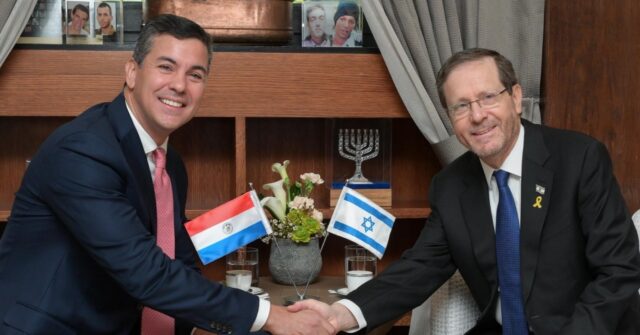President Santiago Peña of Paraguay recently made headlines with his visit to Israel, where he inaugurated Paraguay’s embassy in Jerusalem. This event attracted significant attention as it signaled Paraguay’s solidarity with Israel during a challenging period marked by conflict and regional instability. Peña’s decision reflects a broader trend among a select group of countries—following the lead of the United States, which moved its embassy to Jerusalem in 2018 under President Donald Trump. This groundbreaking shift underscored a recognition of Jerusalem as Israel’s capital, a stance that has sparked various diplomatic responses across the globe.
During the ceremonial inauguration, Peña received a warm welcome from Israeli President Isaac Herzog, who acknowledged the symbolism of Peña’s visit in light of the ongoing struggles faced by Israel, including the loss of citizens and the complex situation concerning hostages in Gaza. Herzog expressed gratitude for Paraguay’s unwavering friendship and commitment during these trying times, emphasizing the significance of international solidarity against hatred and discrimination. His remarks encapsulated a sentiment of shared challenges, reinforcing the idea that Paraguay’s support could serve as a beacon of hope during dark times for Israelis.
Peña reciprocated the sentiments expressed by Herzog, characterizing the trip as a fulfillment of Paraguay’s moral obligation toward its Israeli counterpart. Accompanied by a diverse delegation—including congressional representatives—Peña articulated that moving the embassy was not merely a political maneuver but a manifestation of the Paraguayan people’s attachment to Israel. He highlighted the emotional and symbolic weight of this event for Paraguay, interpreting it as a pivotal moment in the nation’s history that underscores its values of hope, friendship, and future aspirations, while also signaling support for Israel amidst a backdrop of strife.
The move to establish the Paraguay embassy aligns with similar actions taken by several other nations, including Guatemala, Honduras, Kosovo, and Papua New Guinea, which have also relocated their embassies to Jerusalem in recent years. This trend illustrates a growing international recognition of Jerusalem as Israel’s capital and reflects a shift in diplomatic relations, particularly in the context of growing geopolitical alliances. Paraguay’s decision contributes to the narrative of nations standing with Israel at a time when it faces increasing isolation and challenges in the international arena.
In addition to the diplomatic festivities, Israeli government spokesman David Mencer remarked on the significance of Peña’s visit against the backdrop of Israel’s military operations aimed at neutralizing potential threats from Syria. These military actions underscore Israel’s proactive measures to prevent terrorist entities from acquiring dangerous weaponry, particularly chemical arms, in the volatile region following the ousting of Syrian leader Bashar al-Assad. Mencer’s comments highlight the broader security concerns that Israel faces, especially in relation to Iranian activities and the potential for conflict spillover from neighboring countries.
The discussions surrounding Peña’s visit, and the dual symbolism of Paraguay’s embassy in Jerusalem, represent not only the strengthening of bilateral ties between Paraguay and Israel but also illuminate the evolving landscape of international diplomacy regarding Israel. As countries reassess their positions and make decisions that align with their values and geopolitical interests, events like Peña’s embassy opening stand as a testament to the enduring struggle between narratives in a region fraught with historical tensions and complexities. The implications of such diplomatic moves extend beyond mere political gestures; they influence public opinion, aid in regional stability efforts, and articulate the moral commitments of nations within a shifting global framework.

